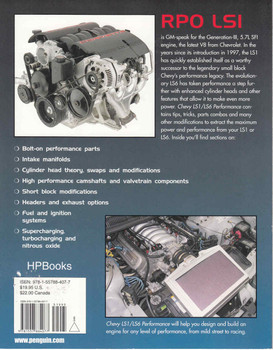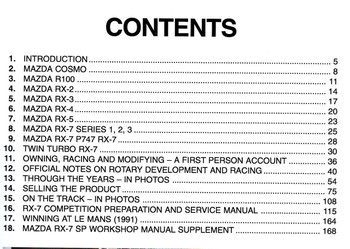Description
By: Mark Warner .
Description
How to build maximum horsepower and reliability into Mazda's 12A, 13B and Renesis engines.
Introduction
Manpower, brainpower and money-power trump horsepower any day." —Dave Coleman, Mazda USA. This is a book about Mazda's Wankel-type rotary combustion engine, which is a compact, lightweight and elcgmdc simple design that uses just three major internal moving parts. In stock form, rotary engines can generate respectable levels of horsepower and torque. They are also nearly vibration-free, and they provide reasonable fuel efficiencies, long life spans and respectable tailpipe exhaust emissions. For the average consumer, Mazda's rotary engine offers solid grocery-getting performance at a reasonable price.
But if you're reading this book, you're probably not an average consumer. In fact, you likely are looking for anything but average performance from your rotary engine. You want horsepower, and you want it now! Or maybe you just want to better understand the inner workings of the odd little engine that resides under the hood of your car. Perhaps you're contemplating some upgrades to an RX-7 or RX-8, but aren't quite sure what steps to take, or who to believe when listening to the sales pitches and claims of aftermarket supply houses. Or maybe you just want to know how such a little engine can produce such big numbers and win so many races.
The good news is that you've come to the right place in your quest. This book was written by and for the rotary engine enthusiast. Intended for the person who wants to explore the performance capabilities of their rotary; this book addresses the engine in a scientific, logical and well-researched manner. In the right hands and with the right technical knowledge, Mazda's rotary engines have the potential to develop amazing levels of horsepower and torque—and do so for hundreds of thousands of trouble-free miles. Planning and building a rotary engine to these levels of performance isn't difficult as long as you know what you're doing and why. With that in mind, this book has been separated into two major parts:
- Part I reviews the history of the rotary engine and its development at Mazda. It also provides a detailed look at the internal workings of the basic engine and describes the proper terminology for all of its parts. The book also compares the operation of the rotary engine to the more traditional reciprocating piston engine. It also looks at the fundamentals of how power is created inside the engine—and describes how to unleash more of that power. This latter item then sets the stage for Part II of the book.
- Part II discusses in detail each of the major subsystems and components of Mazda's rotary engines, and how to modify them for increased performance. This section covers everything from the basics, such as porting, engine internals, exhaust and intake modifications, ignition systems, cooling, lubrication and electronics; to the more advanced, such as turbochargers, water injection and nitrous oxide. In short, all aspects and subsystems of the typical high-performance engine are looked at in detail so that logical and reasonable choices can be made by the enthusiast when contemplating upgrades and changes.
When Felix Wankel invented the little engine that bears his name, he never dreamed that the then-second-tier Japanese automaker, the Toyo Kogyo Company, would license the design, change their name to the Mazda Motor Corporation, and develop the novel engine into such a high level of sophistication. Nor did he likely imagine that legions of Mazda enthusiasts would flock to the diminutive engine with dreams of turning it into street and race-track giant killers.
The Mazda rotary engine is truly the story of the little engine that could, and this book is all about getting the absolute most from that engine.























